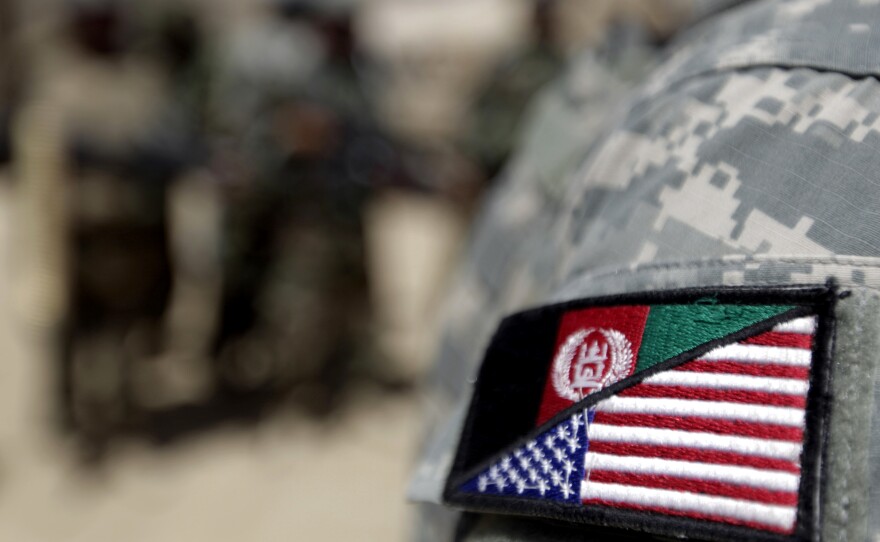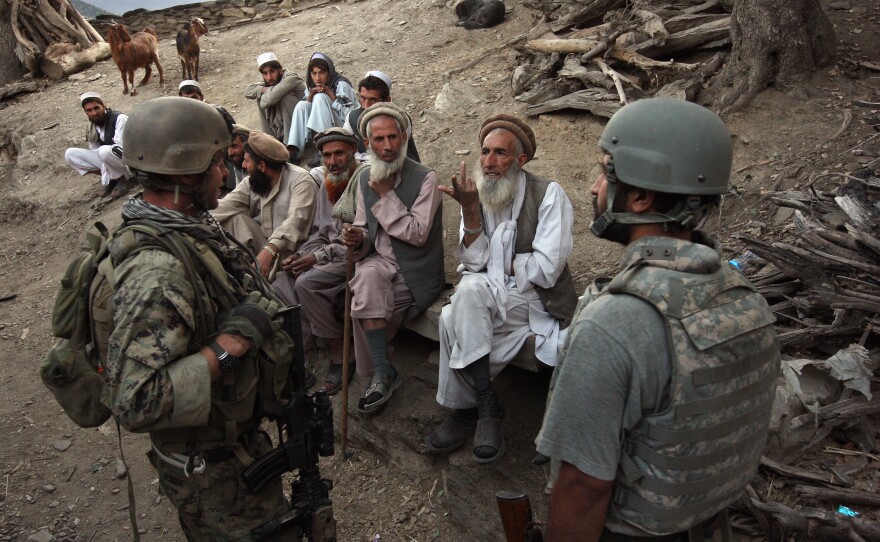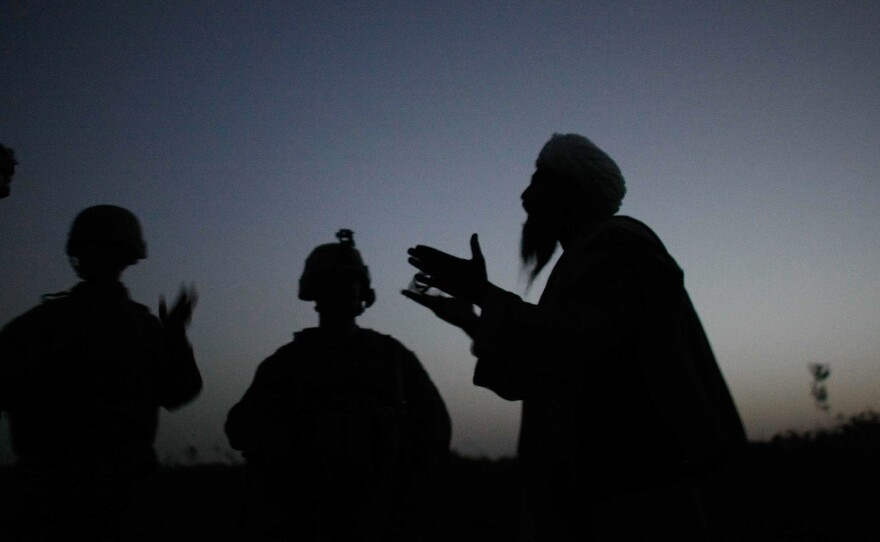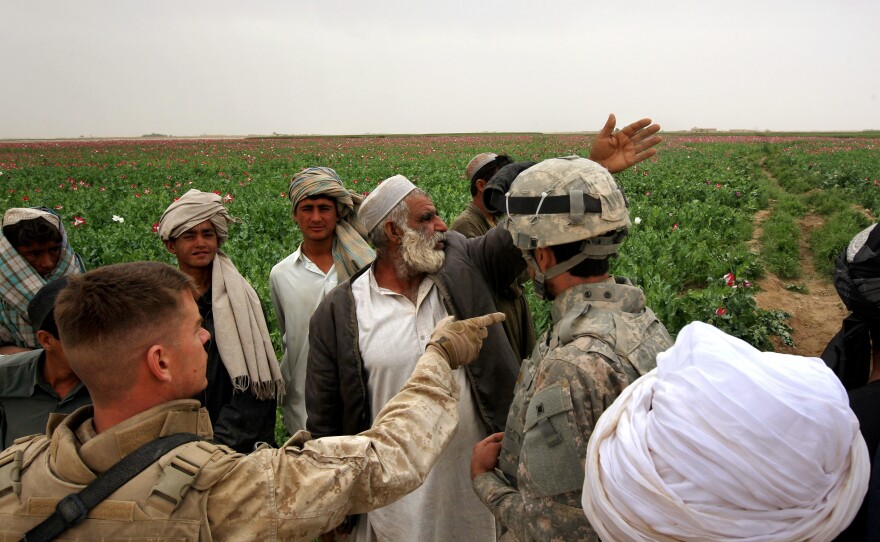On a warm May night, the sound of footsteps and a stranger's voice in the darkness outside his home startled a man in Afghanistan. Alarmed, he went to investigate. He saw that someone had affixed something to his door.
He found a handwritten note: "You have been helping U.S. occupier forces and ... you are an ally and spy of infidels, we will never leave you alive."
Khan, in his early 30s, is only using his middle name out of fear for his life. He had already received a series of death threats — which came, he says, in the form of phone calls to his father from the Taliban. That night in May, insurgents made it clear they knew where he lived.
Khan inspected his home's main gate and found a grenade wired to the doorknob, set to explode if someone opened the gate from inside. He and his father managed to dispose of the device before it could be triggered.
"Fortunately, no one was harmed," Khan tells NPR. He has a three-year-old son, and his wife is pregnant.
Since 2015, Khan has worked on a project for the U.S. Department of Defense that helped prevent Afghan security officials from turning over U.S.-donated military equipment to enemy hands. He says the death threats began shortly after he was hired by the U.S. government, but retaliation against his family worsened — with the Taliban killing four of his relatives since the U.S. announced its withdrawal from Afghanistan last year.
Khan and his wife now keep a 24-hour watch. "During the night, I'm watching from my roof of my home for enemies to not place IEDs [bombs] or mines on my doors," he says. During the day, when he sleeps, his wife takes his place. "We are watching out for anyone that wants to kill us," he says.

A pathway to safety, hampered by delays
In Afghanistan, a crisis is mounting. Taliban and other insurgents are targeting Afghan citizens like Khan who aided U.S. forces. As U.S. and NATO troops completely withdraw from Afghanistan within the next few weeks — the U.S. symbolic deadline is Sept. 11, but forces are expected to be out next month — thousands of Afghans who worked as interpreters, translators, drivers, cooks, cultural advisors and staff for the U.S. military and other U.S. government agencies fear being stranded.
The nonprofit No One Left Behind, which works to help interpreters secure visas, says several hundred Afghan interpreters and their family members have been killed since 2001 because of their association with the United States. The exact number is unknown, as neither the Pentagon nor the State Department keep track.
Afghans who supported the U.S. mission were offered a pathway to safety more than a decade ago. Special immigrant visas are available to those who worked with the U.S. and faced serious threats as a result of their employment. The U.S. has allowed 50 special visas per year to be issued to Afghan and Iraqi interpreters and translators, and has allocated 26,500 visas since December 2014 for Afghans employed by or on behalf of the U.S. government.
But the SIV program, administered by the State Department, is slow and hampered by administrative problems. The process is intended to take nine months to complete, but some applicants have waited years. A 2020 review by the State Department's Office of the Inspector General cites insufficient staffing and the absence of a centralized database.
Today, there are over 18,000 SIV applicants in Afghanistan waiting for approval to come to the U.S. Secretary of State Antony Blinken has said about half of these are in the early stages of the application process.
The coronavirus pandemic has worsened delays. On Sunday, the U.S. Embassy in Kabul suspended all visa operations in response to a third wave of COVID-19 cases throughout the country. (The embassy itself has reported more than 100 cases of infection and one death among employees).
"Those of us who are here feel a deep moral obligation to do everything we can," Ambassador Ross Wilson, the U.S. chargé d'affaires at the embassy in Kabul, tells NPR.
"We're working with our colleagues in Washington to try to cut through those numbers as quickly as we possibly can to meet the obligation that we all feel here, and that our country has, absolutely, to people who served us over the course of our time here," he says. "But it is an immigrant visa, and those take a certain amount of time in any country."

Blinken has said if necessary, the U.S. can consider bringing SIV applicants into the U.S. as refugees.
"I feel I've been deceived by the U.S."
The delays and denials have left many Afghans who worked with U.S. forces and agencies feeling betrayed. "It's like deception," says one man in Afghanistan who spoke with NPR on a Zoom call. He's so fearful for his family's safety, he does not want to use his name. "I feel I've been deceived by the U.S."
In 2012, he began work with a contractor on a project with the U.S. Agency for International Development that supported local community development and governance. Now he's receiving calls from insurgents threatening to kill him and kidnap his children.
"They claim they're the Taliban," he says. "They told me on the phone that 'We know where you live.'"
Since 2015, SIV applicants must prove they had two years of qualifying service with the U.S. government. This man had documentation for one year, so his request for a visa was denied.
"Every day, you can see an increase in the Taliban's presence," the man says. "What am I going to do after September? What's going to happen in November? Am I going to even be alive by December?"
Afghan women are especially at risk
In another instance, an Afghan woman who'd worked in procurement and security projects with the U.S. was denied an SIV because she was just seven days shy of completing the required length of service. Keeping Our Promise Inc., a resettlement program for Afghan, Iraqi and Kurdish interpreters and support personnel based in Rochester, N.Y., is helping the woman ask the U.S. for humanitarian parole for her and her mother.
Women who worked with the U.S. are at especially high risk of Taliban retribution. "While Afghans affiliated with the U.S. are broadly at risk from retaliation by the Taliban and other militias, women in particular face ongoing threats, not only for having worked with the U.S., but also for working in positions the Taliban find unsuitable for women," explains Julie Kornfeld, a staff attorney at the International Refugee Assistance Project, a nonprofit that works to bring SIV applicants to the U.S. "The groups that are opposed to women's rights are especially looking to punish women in these positions, and our female clients have reported that they will be hunted down and killed."
NPR was unable to speak directly with any female SIV applicants. However, IRAP provided this written statement from one Afghan woman who worked in U.S.-funded projects for over 3 1/2 years:
"The Taliban are already here, they are just a few kilometers away from the town where I live. They are not going to show mercy, nor would they listen to any justification. They are thirsty for retaliation, especially against women. They even kill civil servants who worked for the [Afghan] government, then imagine the fate of those who worked for the Americans."

"I want the White House's hair on fire"
Bipartisan calls from Congress are putting pressure on the State Department and the Biden administration to accelerate SIV processing. "I want the White House's hair on fire" over the need to ensure Afghans' safety, Angus King, an Independent senator from Maine, told reporters this week. "The time is short, and getting shorter all the time."
"These people have a bull's eye and a target on their back from the moment we leave the country," Rep. Michael McCaul, the ranking Republican on the House Foreign Affairs Committee, warned this month. "And if we abandon them, we are signing their death warrants."
Last week, a group of Republican and Democratic senators led by New Hampshire Democratic Sen. Jeanne Shaheen introduced legislation that would lower the SIV eligibility requirement from two years of service to a single year. It would also postpone expensive medical evaluations and provide special immigrant status for certain surviving spouses and children of applicants who have been killed.
In May, the top U.S. military officer hinted toward a more immediate solution. "There are plans being developed very, very rapidly here" for a possible evacuation of Afghans who supported the U.S., Gen. Mark Milley, chairman of the Joint Chiefs of Staff, told reporters.
This month, Defense Secretary Lloyd Austin tasked U.S. Central Command Gen. Frank McKenzie "to come up with options potentially for the transportation out of Afghanistan of civilians that might need it, at various levels and under various circumstances," Pentagon spokesperson John Kirby told Defense One. But, Kirby said, "We aren't at a stage right now where evacuation is being actively pursued."
"Please sir, rescue me from the enemy"
Weston Amaya is a retired U.S. Army major who was deployed in Afghanistan in 2011. As an infantry captain, he assisted an Afghan Army battalion stationed in the rugged Pech River Valley in northeastern Kunar province — the scene of some of the war's most relentless fighting.
Amaya says he relied on his interpreter, an Afghan teenager around 18, who was by his side on the morning when mortar and machine gun fire rained down from somewhere out in the mountains. Amaya's interpreter intercepted radio chatter from the Taliban which helped pinpoint the enemy location.
"He was completely fearless," Amaya says. "He and I were having to move from position to position to get the reports, to get the intel. We were moving under fire the entire time."
Since 2013, Amaya has tried, without success, to get his interpreter an SIV. A litany of letters of recommendation from U.S. commanders vouched for his interpreter's bravery and faithful service over the course of three years.
But the U.S. Embassy in Kabul disagreed. In a letter from 2018, which NPR has seen, it informed Amaya's interpreter that he had not met "the requirement of faithful and valuable service to the U.S. government," and his application was denied.
Last month, he received a frantic email from the interpreter, who remains in Afghanistan: "Please sir, rescue me from the enemy. Please do something to save me."
Amaya has renewed his efforts to help his colleague get out.

"Failing to get these interpreters and their loved ones out of harm's way is tantamount to leaving one of our own," Amaya says.
The wait continues
The handwritten death threat and grenade that Khan, the U.S. defense contractor employee, found outside his home last month followed a spate of horrific attacks against his family.
In January, Khan's brother-in-law Mohammad, who also worked with the Defense Department, was shot and killed in front of his 10-year-old son.
Mohammad was driving with his son hidden in the car when insurgents stopped their vehicle. "His small son told me that they were yelling that 'We will kill you,' and 'You have helped U.S. forces,' and when they tried to escape, [Mohammad] was shot," Khan says.
The boy stayed hidden and was unharmed physically. But now he suffers from night terrors, crying out for his father in his sleep.
According to Khan, Mohammad had applied for an SIV in 2010. He was still waiting for his visa when he was killed.
"Here where I live, insurgents are closing in," Khan says.
He himself applied for an SIV in 2018. Earlier this year, he finally received chief of mission approval — the first of many steps in the SIV process. His attorney, IRAP's Kornfeld, says it may take months — if not years — before Khan acquires his visa and can bring his family to safety in the United States.
For Khan, the prospect of such a wait is shattering.
"As I receive threats and my father receives calls from the Taliban, I fear that after the U.S. withdraws, if we're left behind, me and my family will be killed by insurgents," Khan says. "Not only me and my family, but many families and many like me will be killed."
H.J. Mai contributed to this story.
Copyright 2023 NPR. To see more, visit https://www.npr.org. 9(MDAzMjM2NDYzMDEyMzc1Njk5NjAxNzY3OQ001))







